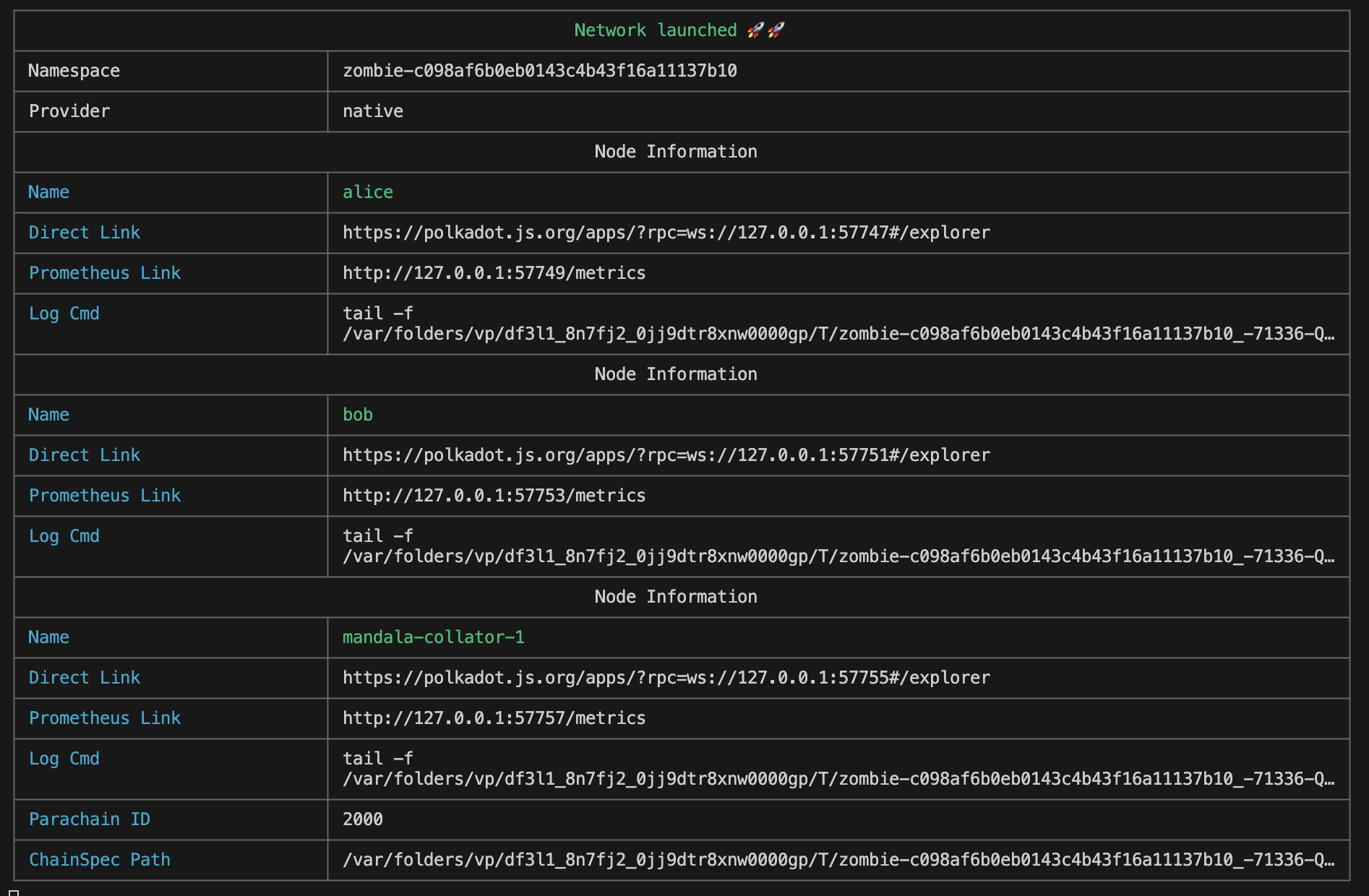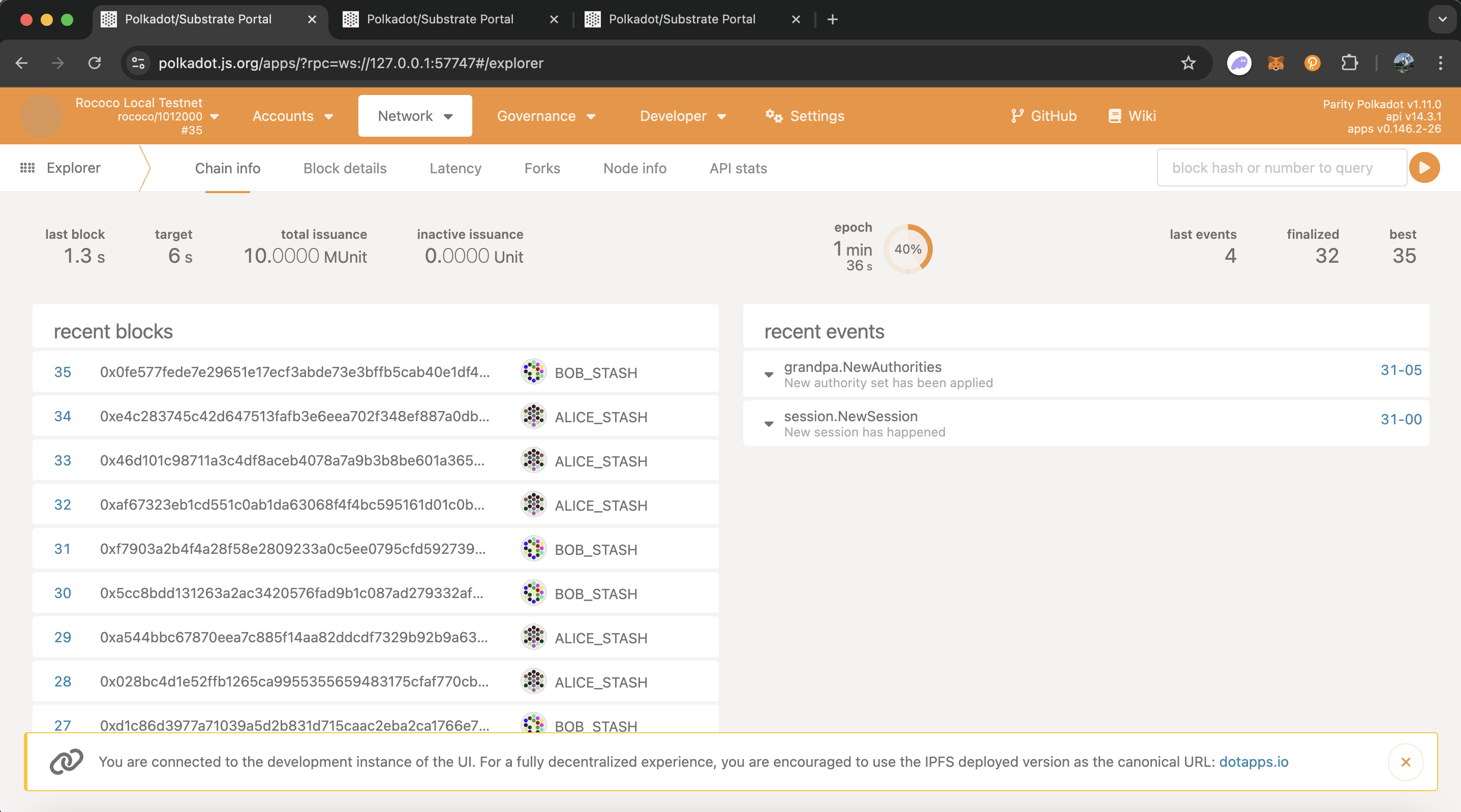Run a Collator Node
This guide provides a detailed explanation of collator nodes within the Mandala Network and step-by-step instructions for setting up and running a collator node.
Overview
What is a Collator Node?
Collator node serves a critical role in the Mandala Network, where it produces blocks on parachain. Collator node collects user transactions and aggregates them into block candidates. These blocks are then provided to the Relay Chain validators along with Proofs of Validity (PoV), ensuring that the proposed blocks meet the network's rules and standards. Validators then will be responsible for the finalization.
Collators maintain the parachain's state and ensure smooth communication between the parachain and the Relay Chain.
Collators do not provide security guarantees for parachains. Instead, they rely on the Relay Chain's security model to finalize blocks. For more info learn here
Role of Collator Node
Collator nodes serve several essential functions in the Mandala Network:
- Block Production: Aggregate transactions into valid block candidates and propose them to Relay Chain validators.
- State Maintenance: Maintain the full state of the parachain to ensure validators can verify blocks efficiently.
- Network Bridging: Act as intermediaries between parachains and the Relay Chain, facilitating cross-chain communication.
- Consensus Participation: Operate within the Aura consensus mechanism to produce blocks deterministically while leaving finality to validators using GRANDPA.
In Mandala’s non-permissionless setup, only pre-approved collators are allowed, ensuring network security and reliability.
Getting Started
Project Setup
- Clone the Mandala-Node repository.
git clone https://github.com/MandalaChain/Mandala-Node.git
- Navigate to the directory
cd Mandala-Node
Requirement
To run Mandala-Node, you will need to have Rust installed in your machine. Depending on your operating system and Rust version, there might be additional packages required to compile the node.
If you haven't had rust on your machine or encounter version error, run following scripts:
.maintain/scripts/install-rust-toolchain.sh
Successful stup will produce following output:
installed toolchains
--------------------
stable-aarch64-apple-darwin (default)
nightly-aarch64-apple-darwin
1.75.0-aarch64-apple-darwin
solana
installed targets for active toolchain
--------------------------------------
aarch64-apple-darwin
wasm32-unknown-unknown
active toolchain
----------------
stable-aarch64-apple-darwin (default)
rustc 1.83.0 (90b35a623 2024-11-26)
Default host: aarch64-apple-darwin
rustup home: /Users/[USERNAME]/.rustup
installed toolchains
--------------------
stable-aarch64-apple-darwin (default)
nightly-aarch64-apple-darwin
1.75.0-aarch64-apple-darwin
installed targets for active toolchain
--------------------------------------
aarch64-apple-darwin
wasm32-unknown-unknown
active toolchain
----------------
nightly-aarch64-apple-darwin (overridden by +toolchain on the command line)
rustc 1.86.0-nightly (b3b368a18 2025-01-05)
Rust toolchain installation and configuration completed successfully!
Running a node
-
Download Zombienet Zombienet is used to run Mandala Node on development chain since it requires a relay chain to connect to. Later we will spin up a 2-node rococo local testnet instance using zombienet.
.maintain/scripts/download-zombienet.shIf successful, you will find zombienet binaries on these location
.maintain/zombienet/binaries -
Compile Mandala Polkadot
.maintain/scripts/compile-mandala-polkadot.shinfoCompiling the Mandala Polkadot takes a significant amount of resource and time. On Macbook Air Apple M1 (2020) it took approximately 2 hours for the compilation to finish. Please wait patiently and let the code cook.
If successful, you will find mandala binaries on these location
.maintain/zombienet/binaries -
Start the network Run following commands:
.maintain/scripts/start-zombienet.sh <chain-type>There are 4 chain types available to run
local: Local development chain (Mandala)mainnet: Production chain (Mandala)dev: Development chain (Niskala)live: Live network (Niskala)
Successful run will produce following result:

-
Connect to Polkadot.JS Front-End You can view the network detailed information by connecting it to the Polkadot.JS Front-End. Follow the link given that showed up when running the network.
 tip
tip- Interacting with the blockchain requires Polkadot.JS account. If you didn't have one yet, follow this article
- It's recommended to use Google Chrome for accessing the Polkadot.JS app
Congratulation! You've successfully run Mandala collator node. If you find any difficulties during the process, feel free to contact our support team in Discord or Telegram